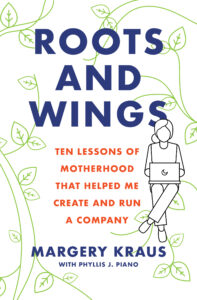Praise in Public, Criticize in Private by Margery Kraus, author, ROOTS AND WINGS (Book Excerpt)
 CHAPTER TWO —————
CHAPTER TWO —————
Lesson Two:
Praise in Public, Criticize in Private
As parents and as leaders at work, one of our most important jobs is building character and self-esteem. Public criticism and attacks are the fastest ways to tear people down and destroy self-confidence.
One of the guiding principles in raising my children and developing people at work has been to help them grow and learn by teaching them to deal with and overcome their mistakes. I have made it a practice to never publicly humiliate others. When mistakes are made, pull aside the involved individuals and have a discussion so you can help them learn and move forward in a positive way. Do not criticize in public and embarrass those who have erred.
This lesson was reinforced when I was a target of bad behavior. In the early days of APCO, when it was part of the law firm Arnold & Porter, the senior partner in charge was fiercely critical of me in front of staff. Afterward, I asked to talk to him behind closed doors. When we were alone, I told him that what he just did undermined him and his authority. He brought shame on himself, not me.
I also told him that he would never do that to me again in public. I made it clear that I was perfectly prepared to hear any criticism he had of me, but not in the hallway, at the top of his lungs, for all the staff to hear.
This particular individual was a bully, and it was important for me to set the stage with him early for how we would operate in the future. I communicated calmly and wasn’t disrespectful to him in any way, as I did not want him to perceive me as a threat. Interestingly, as I had predicted, the staff lost respect for him, not me, for his behavior and comments. I made it clear that criticism should be constructive and given in private, not in a public setting. Those who witnessed his bad behavior learned from the example I set in handling it behind closed doors.
I have run across a number of bullies during my long career, and I’ve found it important to lay down the ground rules and call out this type of behavior as soon as it happens. It’s interesting that a fairly high percentage of bullies can dish it out but can’t take it. When confronted privately on their behavior, many bullies immediately back down, as they aren’t used to people calling them out on how they treat others. And believe me, their bad habits will continue until they are directly asked to stop.
I have been happy to hear and be part of the national discussion on “Me Too,” and while I think we need to be careful we don’t take this too far out of proportion, some men have felt they had a license to abuse women over whom they had power. I don’t know too many women of my age who have not had a “Me Too” moment, or moments, and they are very disempowering. At the same time, we have to support all those men who have supported us. I have been lucky to have a lot of men in my life who have helped me when I was down, provided constructive feed- back when it was needed, and made me feel normal again when I had been badly bruised by destructive behavior. I worry about the lack of civility today and balancing the les- son of this chapter against today’s norms of society, including the impact of social media.
It has been rather shocking to me to witness the changes in what is considered to be permissible. As Lisa said, she tried to teach her kids, as I did mine, to have manners, respect each other, and be positive contributors. I know that in Evan’s and Mara’s households, mutual respect is the core value, and failure to observe that has consequences. And to me, it is a core founding principle of APCO. Yet it is hard to reinforce the importance of these values when we have given everyone a megaphone through today’s politics and social media and there aren’t any guidelines. When you see bad behavior, speak up; don’t let it go on. Constructive criticism delivered respectfully most likely will benefit you and those around you, as they are also suffering because of the bad behavior.
My advice: both at home and in the workplace, build character and self-esteem, stand up for what is right, and treat all people with respect. We want our kids, as well as those who work for and with us, to be confident and feel good about themselves. As parents and leaders within our families and companies, we must build an environment of respect, which means never demeaning people in public. In this way, we must ask ourselves as leaders: How do I act in public?
If we exhibit bad behavior at work and at home, I am afraid we are setting a bad example, and our kids and those we lead could be on a track to disappoint, as they very well may follow this less-than-desirable lead.
The common threads in praising and criticizing children and staff are honesty, consistency, and respect.
I don’t need to say much about honesty because, as parents and workplace leaders know, children and employees can sniff a false note from a mile away. They want— and demand—authentic parents and leaders. We must be consistent in our behavior so kids and staff know what to expect. And respect is key and a two-way street.
Praising our kids is easy to do and a pleasure. How rewarding it is when our children do the right thing, help others, say something insightful, get a great grade, make the team, graduate . . . As parents, we feel so proud. When the praise is bestowed in front of others, our children feel great pride and a real sense of accomplishment. There were so many times over the years that tears came to my eyes when my  kids did something wonderful. I have to admit that it still happens, even though my oldest has just passed fifty! And now it happens with my grandkids too. The only ad- vice here is to make sure that the praise is earned.
kids did something wonderful. I have to admit that it still happens, even though my oldest has just passed fifty! And now it happens with my grandkids too. The only ad- vice here is to make sure that the praise is earned.
Too much praise, especially unearned, won’t be heard over time.
Margery Kraus, founder and executive chairman of APCO Worldwide, a global consulting firm headquartered in Washington, DC, specializes in public affairs, communication, and business consulting for major multinationals. As exemplified by a quote from American University President Sylvia Burwell in Kraus’ upcoming book (October 2019)—Roots and Wings: Ten Lessons of Motherhood that Helped Me Create and Run a Company—Margery is “an extraordinary woman who’s making a positive, lasting impact and building a better world” and she teaches all of us how to be a leader.















